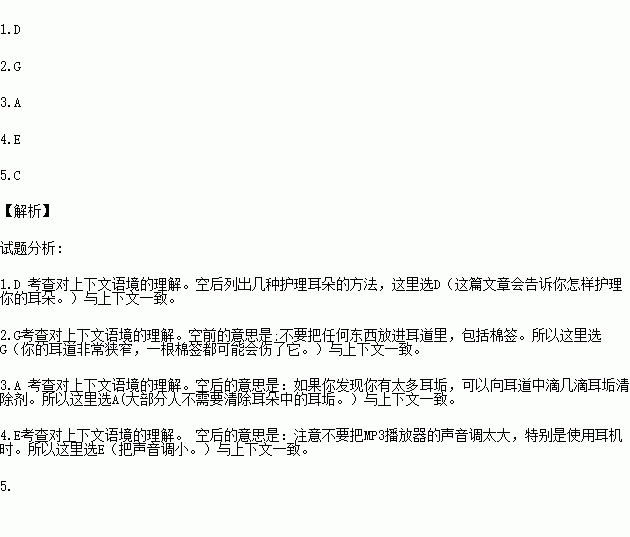题目内容
根据短文内容,从短文后的选项中选出能填入空白处的最佳选项。选项中有两项为多余选项。
How to Care for Your Ears?
Ears not only let us hear, but they also play a role in maintaining our balance, which is vital to our ability to function in daily life. Yet, we ignore them. We can’t even see our ears, except in a mirror. We take for granted what they do for us day in and day out-until we notice something’s wrong, such as when an earache strikes or when we start having to ask people to repeat what they say. 1.
◆ Clean your ear with a washcloth-covered finger only.
Never put anything inside your ear canal, including cotton swabs (药签). 2.
◆ Leave earwax(耳垢) alone.
Wax is your ear’s way of eliminating(消除) anything foreign that gets into the ear canal. 3. If you find you have too much earwax, use a few drops of earwax remover(去除剂) in the canal. After a few minutes, wash the ear with warm water.
◆ Avoid noisy places.
Rock concerts and construction sites are just a few places that frequently have noise levels that can damage hearing. Any place where you have to shout to be heard should be avoided.
◆4.
Be careful not to play MP3 too loud, especially if using earphone.
◆Be careful with illness and medications.
Respiratory (呼吸的) illnesses should be treated to avoid their spread to the ears. Certain medications can damage hearing, so follow the directions carefully before taking them.
See your doctor if you suffer from sudden hearing loss or hear noises in your head. 【小题5
A. Most people don’t need to clean wax out of their ears.
B. In such case, go to see a doctor as soon as possible.
C. These can be symptoms of a serious illness which needs to be treated.
D. This article will show you how to care for your ears.
E. Turn the volume(音量)down
F. Avoid using earphones while listening to MP3.
G. Your ear canal is very narrow, and a swab can damage it.
 阅读快车系列答案
阅读快车系列答案
